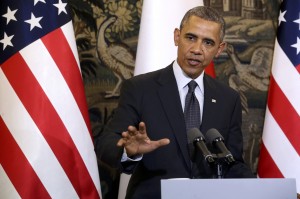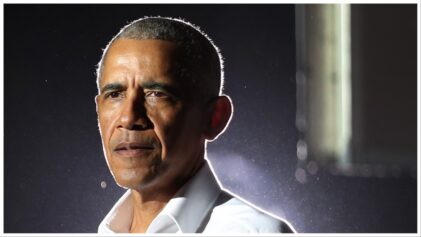
Observers took the ayatollah’s plea as a sign of Iraq’s desperation as the al-Qaeda-connected militants took over Sunni areas in the north, the Kurds seized control of the city of Kirkuk, and the Shiite-led government tried to regroup its army after the humiliations of the past three days. The Iraqis claimed they had recaptured Tikrit, the home town of the late president Saddam Hussein, who was deposed by U.S. troops sweeping north from Kuwait in 2003.
As the world looks to the United States to see how Americans will react to the disintegration of a nation whose fate has been lashed to theirs for decades, President Obama ruled out using U.S. ground forces to bring stability.
The president said Friday that he would make a decision “in the days ahead” about whether to use American military power.
“This poses a danger to Iraq and its people and, given the nature of these terrorists, it could pose a danger eventually to American interests as well,” Obama said. “We will not be sending us troops back into combat in Iraq, but I have asked my national security team to prepare a range of other options.”
In his televised statement, the president said the planning would take “several days” to make sure airstrikes are effective.
“People should not anticipate this is something that is going to happen overnight,” he said. “We want to make sure that we have good eyes on the situation there. We want to make sure we’ve gathered all the intelligence that is necessary so that if I do order action” it will be precise and direct.
The president warned Iraqi leaders that if they want American help, they need to devise a plan to accommodate their nation’s minority factions.
“The United States is not simply going to involve itself in a military action in the absence of a political plan by the Iraqis that gives us some assurance that they’re going to work together,” he said. “We’re not going to allow ourselves to be dragged back into a situation where when we’re there we’re keeping a lid on things” while the political leaders fail to address the underlying fissures dividing Iraqi society.
CNN has reported that the Pentagon was moving an aircraft carrier, the USS George H.W. Bush, to the area.
While the U.S. is considering offering assistance to the Iraqis, the ease with which the insurgents overtook the Iraqi army undermines U.S. claims to have established a unified and competent military after more than a decade of training—and a cost to the U.S. of close to a trillion dollars and the lives of more than 4,500 soldiers. In addition, more than 100,000 Iraqis are said to have died during the U.S. occupation.
The Sunni Muslim insurgents are led by an al-Qaeda offshoot called the Islamic State of Iraq and the Levant (ISIS). They made incursions in Saddam Hussein’s hometown of Tikrit after first capturing Mosul, Iraq’s second city. They also control a large swathe of territory in eastern Syria and western and central Iraq.
It is clear that, as has been threatened for years, Iraq is on the verge of breaking apart, into Shiite, Sunni and Kurdish enclaves that amount to the de facto partition of the country.
There was a troubling video posted on YouTube that showed hundreds of Iraqi soldiers captured at the former Speicher U.S. military base being herded by the militants to an uncertain fate. Some observers feared that they had been executed.
The Kurdish forces took advantage of the chaos to assert control, unopposed, of the city of Kirkuk, an area they have long coveted as it sits on top of a large—though depleted—reservoir of oil.
In Mosul, one of Iraq’s most important cities, the ISIS militants issued an 11-point charter that dictated the creation of an Islamic state. The new laws outlawed alcohol, cigarettes and drugs, mandated that citizens will henceforth be required to pray five times a day, thieves will have their hands amputated, and women must stay indoors except in cases of emergency.
“To those of you who ask, who are you? The answer: We are the soldiers of the Islamic State of Iraq and Syria . . . who took it upon ourselves to bring back the glory of the Islamic Caliphate and turn back injustice and indignity,” the charter announced.
“Whoever hated us yesterday is safe, unless he rejects, fights or abandons Islam,” the charter said. Those who oppose their new rulers, however, will be “killed, crucified or have their hands and feet cut off,” it added.
Showing just how much the citizens hated the Shiite-dominated government, many people welcomed the ISIS fighters in the mostly Sunni city. There were celebrations on the streets and video showed ISIS fighters parading some of the booty they captured from fleeing security forces, including an assortment of army and police vehicles.
“Normal people, like me, we aren’t scared,” Wissam Attiyeh, a 33-year-old electrical engineer who was leaving town with his wife and five children, told the media. “The ones who are scared are those who did something bad in the past, like those in the army and the police.”
He said ISIS had restored electricity, were running services and that shops and businesses have reopened.
“People are willing to give them a chance,” he said.


